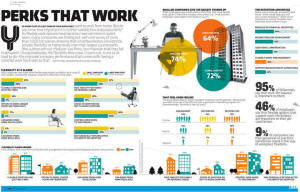|
Expectations and compliance willingness of employees and employers, respectively, have changed a lot since I first
entered the workforce in the 1970s. At the time, at least for the companies I worked for as an electrician, the
boss told you what to do and you did it. You showed up for work at a dictated time, worked hard all day with
strictly prescribed break and lunch times, and quit at the end of your shift. Production line and office workers
pretty much followed the same routine. I assumed everyone existed by the same rules.
It wasn't until after I got
out of the U.S. Air Force in 1982 and went to work for Westinghouse as an electronics technician that I witnessed
the difference between the way 'professionals' were treated and the way hourly workers were treated. Engineers and
managers pretty much came and went (within reason) as they deemed necessary. We punched in and out on a time clock
and had to have special permission to pass through the entrance guard station outside of about a ±10 minute
window of time at shift changes. The engineers I worked for roamed the buildings freely while we were restricted
to specific areas. They went to the cafeteria for coffee whenever they felt like it; we went during our 15-minute
morning and afternoon breaks. Our lunch and breaks time were not included in the 8-hour workday. The professional
ranks were paid to do a job, not necessarily to be there 8 hours a day. It was a lot like the difference between
being enlisted and being commissioned in the military service.
 Along
with desperately wanting to be an engineer for the opportunity to design and direct cool stuff, I knew the perks
would be icing on the cake. So, I embarked on a long, tedious adventure to earn my BSEE degree, often carrying a
fulltime course load in an effort to expedite the conclusion. The way things worked out, I first earned an
Associates degree in an engineering transfer curriculum at a community college that had a deal with the state
university to teach the same courses as their freshman and sophomore years, allowing graduates to begin with the
junior year once transferring to the university (i.e., no wasted classes). I graduated with a BSEE in spring of
1989, only seven years after starting (ugh!). Along
with desperately wanting to be an engineer for the opportunity to design and direct cool stuff, I knew the perks
would be icing on the cake. So, I embarked on a long, tedious adventure to earn my BSEE degree, often carrying a
fulltime course load in an effort to expedite the conclusion. The way things worked out, I first earned an
Associates degree in an engineering transfer curriculum at a community college that had a deal with the state
university to teach the same courses as their freshman and sophomore years, allowing graduates to begin with the
junior year once transferring to the university (i.e., no wasted classes). I graduated with a BSEE in spring of
1989, only seven years after starting (ugh!).
My first engineering job was at General Electric. Side note: Neither they nor Westinghouse exist any longer with
military electronics centers. I quickly learned that the perception I had of the 'freedom' enjoyed by engineers
was purely an illusion. It turns out the flexibility enjoyed during the work day was mainly to compensate for the
often long work days that went late into the night - without the benefit of overtime pay that labor laws mandated
for hourly workers after the base 8 hours. The level of responsibility that went with being an engineer was way
more than that of a technician. That's not to say that technicians don't have a high level of responsibility, the
way of the corporate world, at least in the day, was that if a problem arose in the production build, test, or
shipping stages that could not be resolved by the hourly guys, it was the engineer who was expected to stay until
the problem was solved. On many occasions I was at work late into the evening for days on end trying to get to the
root of a tricky issue. Sometimes I'd go home for dinner and then return, but usually it meant eating snack
machine food for dinner. Although I regretted having to sacrifice family time, the rigors of the experience did
provide an incredible education. The same scenario played itself out at every company I work for. It obviously
went with the territory.
Over the years, I noticed that a definite shift occurred in the 'freedoms' conveyed on hourly workers such as
flexible work hours, more lenient policies of movement about the facilities, etc. I was reminded of all this while
reading an article in the November 2014 issue of Inc. magazine titled, "Perks That Work." It doesn't
distinguish between hourly and salaried workers, but it's probably safe to assume it applies to both. According to
the author(s), many companies are finding it necessary to offer increasingly more perks to employees to keep them
around - and to attract them in the first place. Some of it, I suspect, is at least partially due to employees
being more resistant to having their work days strictly regimented. What was so interesting about the article is that almost every
item I can remember having lacked in accommodation over my career is mentioned. The only one that never applied is
whether or not I could return to work after childbirth.
Posted November 12, 2014
|


